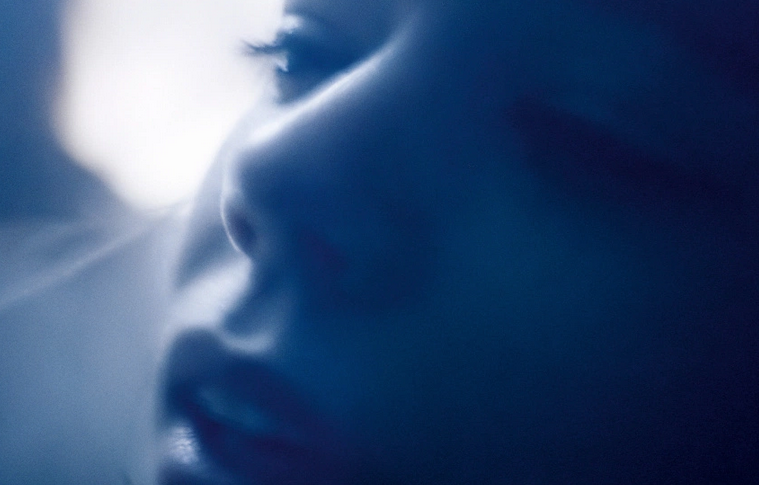
The word on the street about Victoria is that it’s a must-see for one reason: its entire two-plus hour runtime was captured in a single, pulse-pounding continuous take. While that aspect is definitely paramount, don’t think the film has nothing else to offer. As my review notes, this thing gets your blood pumping as much from the authentic performances of regular people in over their heads as it does the technical artistry. And the man leading the way to orchestrate both these halves is Sebastian Schipper.
We talked with the co-writer/director about his trust in cast and crew as well as what he believes is crucially important—embracing imperfections to better portray his characters’ universal humanity. The main quartet must be relatable in this way in order for us to invest the time necessary to follow them on their escalating adventures around Berlin. We empathize with his local crew of misfits caught in the clutches of a gangster and vicariously breath along with Victoria as she willingly thrives within the danger her as-yet life on the straight and narrow never allowed.
The Film Stage: You have this insane idea for a film to capture an adrenaline rush of action, drama, romance, and comedy all in one take. Does that pitch get financiers and producers excited or does it make it hard to find collaborators willing to take the plunge?
Sebastian Schipper: I think if you want to get people excited you have to be excited yourself. I think a lot of people underestimate that. A lot of people who go into film or want to become directors underestimate how much they have to get involved themselves to get other people involved.
Having said that, I don’t think I could have pulled it off had this been my first film. I did three other films before in Germany and I pretty much called the people I worked with [on those projects] and they appreciated my work and took the chance. Also, I had a fallback scenario where I was telling them that if I can’t pull off the one-take I’m going to throw together a wild jump-cut version of it.
Did you actually play with that idea or were you happy with how the single takes were progressing?
We did try it out and it didn’t work to be honest. It didn’t come together at all. So we had to do it in the one take and we were only able to do that on the last try.
Did your history as an actor help your preparation behind the camera? Did it give you pause logistically knowing how far actors will go for so long a session or perhaps push you to push them even further?
I think that’s my job as a director: to push people far. And I also know having been an actor that if there is purpose you don’t mind it. That’s why we do what we’re doing—because we want to experience something.
There’s this quote from A Brave New World. It’s been a long time since I’ve read the book, but this one guy says, “We have comfort for you.” And another guy says, “I don’t want comfort. I want pain, sin, God, poetry.” I think deep down of course there’s a superficial aspect in us that wants to be comfortable, but at the same time we’re longing to do something that really has meaning.
I believe actors do that and the moment you can convince them that what we’re doing is meaningful, they’re really willing to go very far. But you have to come with them. You can’t count on them to go far while I watch. I think within this project they knew I was willing to take a huge risk because if this doesn’t work it’s me who didn’t pull it off. Not them.
It was a great playground and for me. I produced it myself. I don’t think anyone else would have reproduced it the way we produced it.
What was the cast process like considering you really needed to find actors you could completely trust? There wasn’t room to yell, “Cut!” and rework their performance on the fly.
Yeah. I met people and worked with them. I tried out how we would get along and how well they were at improvisation. And I was lucky enough to find these great people.
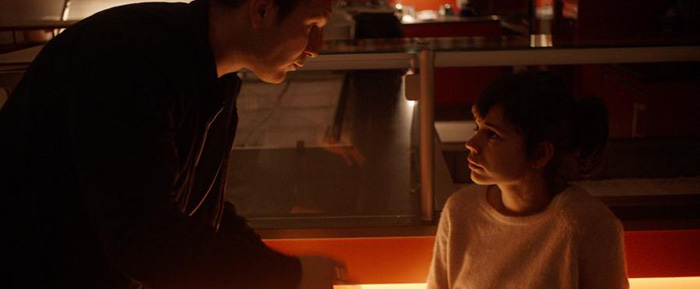
With most of the dialogue being improvised—
Yeah, all of it.
I thought there was a great moment when Frederick Lau (Sonne) slips and says “hotel” instead of “café” at the beginning because it works so well on two levels. It’s a testament to the technical process of being able to push through the mistake and a perfect bit of storytelling displaying mankind’s nervousness in romantic situations.
Yeah. I agree one hundred percent.
What were you thinking when you heard him?
I don’t know if that was a—I wasn’t able to watch every little second and I don’t know. Honestly I can’t even tell you what I was thinking at that moment. [laughter]
Probably what I was thinking was that I had a feeling this take was going well. I don’t think I was thinking about his line at that very moment.
There are a lot of people comparing it to Birdman for the one-take aspect, but Birdman isn’t in real time and can still use jump-cuts. You don’t have that luxury. Could you talk about location scouting and trying to condense the playing field so there aren’t story lulls of characters traveling far?
I think comparing Victoria to Birdman is out of some kind of helplessness because people need to put things into boxes. If you look at Russian Ark, Birdman, and Victoria—they have nothing in common.
Nothing at all.
No. It’s completely—one film is in a museum. You know? [laughter] Maybe for some people going to a museum and robbing a bank is the same kind of thing to be doing. [laughter]
There’s also—if that’s what you want to call it—a “rivalry” effect with Birdman and Victoria. That’s also I think fabricated. Of course it kind of comes around as a compliment to me, but at the same time Birdman is also a crazy film that took a huge risk. I can’t imagine—from what I heard—casting Michael Keaton for the lead. That was a true challenge for this project. It was a really ballsy project whether it was an entire one-take or not. And I love that aspect of Birdman. I also admire that in Russian Ark on some level, but that film is not as close to me.
So what I think all these films have most in common is that there’s a spirit to do something different. I like that a lot. Whether [the one-take is] really accomplished or whether it’s in a museum or not, that’s why I have a feeling these films maybe are connected. But not on the level of someone pulled it off and someone didn’t. We have to do something different. We have to be daring in what we’re doing.
What about finding those locations and keeping everything so close? There are a couple of silent stretches where the score takes over to add intrigue to the otherwise uneventful travel interludes that I thought were great as segues to mask it too.
I really like this place in Berlin—this street called the Friedrichstrasse. It’s this big shopping street. Later when they’re at the hotel is the really rich end of this street, but where the film starts is the kind of poor projects style.
Normally if you want to shoot a scene in a garage, what you do as a director is look at twenty garages or thirty or something. And here I had only one. You know? There was also like a parking deck kind of thing that was open to the side where I thought, “Ah, I’m not sure we can use that for them to rehearse to rob a bank.” And then the garage came around.
The thing with the bank—I wanted to use a different location. It was a little too expensive and so we had to settle for [the location we used].
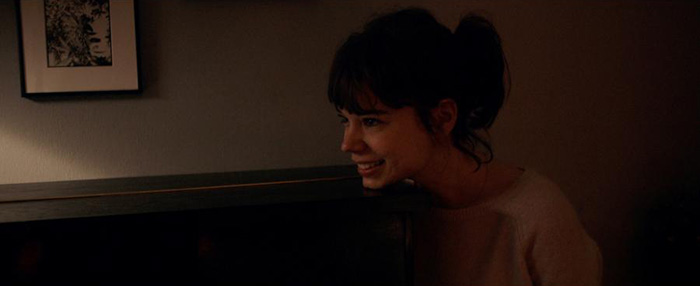
It was great because I lost so much power as a director within shooting Victoria. At the same time so much was reinforced. We went to the core of so many things. The core for me is not making the movie precious with the best looking direction and the best lines, but to get at the core of what’s really going on. What’s the inside? What’s the fear and the joy and the hope; the pain within these people; the dirt under their fingernails? That’s what I like.
Even though [the question seems to be], “How did you find the locations?” I think that again gets back to the core. It’s a little like—somebody told me it’s a little like The Princess and the Wolves. And I like that because I like classic stories. For me it’s almost like in music, in Soul. Soul is perfect compositions, wonderful songs. But if they’re not being delivered with pain and dirt and street, [they miss being the] most powerful music there is. Clean Soul is the worst music there is and real Soul is the shit.
I think now looking at the film, that’s somewhere I wanted to go. And even though it’s sometimes meant, [sometimes it isn’t]. You know, the elevator is not there when they arrive. Freddy—Sonne—puts the bottle of beer on the piano with the label facing our camera, which I hated at the time.
But it’s not about perfection and that’s also sometimes the difference between a true musician and a session musician. A session musician makes no mistakes. They know everything. They play the first couple of tunes and they know, “Oh, this is the Blues? Okay this is how we play it.” You feel that.
You need a musician to come in who doesn’t have the perfect voice and makes mistakes. But the right mistakes—all of the pain and different necessities to make music. Not, “Oh, I love music! I love singing.” You need to really love it—love it because you need it. Because you’d go crazy if you couldn’t sing. That is something I tried to get by bringing my actors and myself as close to it as possible.
And I’m telling you man, there were many moments when I thought, “Aw man, I want it perfect.” Now they’re sitting in this car forever to get to the garage. I like the garage, but they just have to go there forever. [laughter] I was in pain at times because of course I’m a director; I want to make everything perfect. That is one of the super crazy aspects of directing and making films.
Nobody leaves the cinema and says, “Oh I love this film because they made no mistakes.” You want something. When you go to a concert or play a record or whatever—play a song, watch a videotape—you want this feeling that they really gave their guts to what they’re doing. It can also be a comedy or something light, but you have to have this feeling that this really meant something beyond the point of, “We would love to sell you this product.”
So, yes, sometimes I felt like I was in the wild when it’s raining and you’re camping and you hate everything and you want to be back home with your shower. I knew we were out in the wilderness, but at the same time I knew what we were doing was really extraordinary. Looking back—being back with my shower and all my comfort—I look back on that trip and it was tremendous.
And whoever is going to do that—I know one day someone is going shoot another great one-take movie and some people are going to like it and other people aren’t. But I know one thing: whoever is going to do that, they’re going to bleed. They’re going to cry and they’re going to sweat, and they’re going to wet their pants, man. They will have to pay in heavy currency for this experience and that’s also going to be great for them. Hopefully.
That’s the best answer I can give you concerning locations. [laughter]
No that’s great. And I think a lot of that comes through because there are so many emotional and tonal shifts throughout Victoria’s adventure. Her trying to start the car in front of the bank—that’s just such a tense scene because we’re not seeing the robbery. For all we know they are getting caught. Watching her chaos instead is perfect.
Yeah, I like that you say that. I understand when people say, “Hey, it’s about a bank robbery. Why don’t we see the bank robbery?” I understand that. But even if there would have been a bank behind those windows—there wasn’t—I still would say for me the most interesting thing is to stay with her. Even if I could have gone anywhere, in this kind of movie I stay with her.
And she goes just crazy because she doesn’t know what’s going on and maybe she’s going to run away. Maybe she’s getting out of there. Maybe she isn’t. Is she going to stay? Are they going to make it? What the fuck’s going on? That was for me more interesting than the gun waving and the yelling that we’ve seen before in the garage.
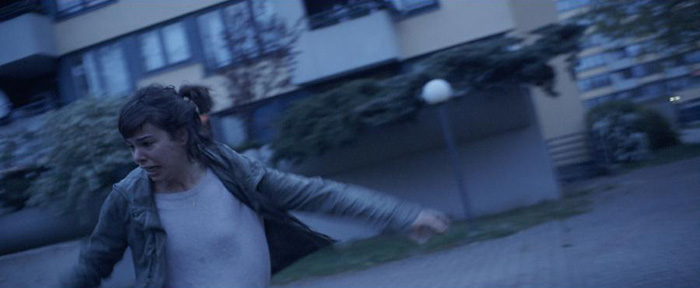
There’s some of that with the guys too. I feel like Hollywood would have made them all ex-cons who’ve done this before. But even Boxer [Franz Rogowski] who is an ex-con—he doesn’t know what’s going on. He’s unprepared. Does that sense of everyone being unprepared help the audience enter more comfortably?
I hope it does. I do what I believe in and what I find interesting. And what I like about Boxer—I really appreciate you mentioning him because sometimes the tent poles of this project are the one-take, then Laia Costa‘s amazing performance, and then it’s Frederick Lau. I think sometimes Boxer is a little [overlooked].
He looks like a skinhead, is super aggressive, and fights all the time. It’s super easy to see him always getting in trouble all his life. But at the same time I think he’s touching. You can see that he’s not just a bully. He’s really overwhelmed with life. I can see him having a big brother that was always beating him up. And that was kind of a story we had with Boxer because I believe that these guys have to be touching. They are wolves, but they’re puppies. They’re not jaded assholes that don’t give a fuck. They just kind of ended up on the outside. They ended up on the dark side of town. They’re like outside the Green Zone, you know? [laughter] But that doesn’t mean they’re assholes. There’s a lot of solidarity going on between them.
And for Victoria, being the “princess” maybe—she’s a princess that just got kicked out of the palace. Somebody told her one morning, “You’re not a princess anymore, by the way. You can go now.” And maybe she was scared in this moment because she doesn’t have the palace anymore or the little crown and all that. Maybe the moment where she runs into the boys she thinks, “What the fuck? Maybe there’s an upside to not being a princess anymore. Maybe now I can finally do some stuff that I never did. I can dance by myself. I can drink a shot. I can try in a shy way to hit on the barkeeper.” So when the guys come around—”I’m just going to have a beer with them. What’s going to happen?”
I know some people are—and I think it’s a cultural thing a little bit, but maybe also what people are afraid of [themselves]—they are scared for her. I can understand that in a way, but I can also understand her going with them.
It’s liberating for her.
Did you have a feeling towards that?
Yeah. It’s liberating for her. She wants everything that’s happening—that sense of adventure and danger. She goes headfirst.
I think you’re right one hundred percent and I believe some stuff you only know looking back—in life, but it also in movies. If I look back now on Victoria—and I’m not going to say that this was a conscious choice, but maybe intuition. The only person that truly needs this bank robbery is Victoria.
Andi the gangster [André Hennicke] wants his money; Boxer wants to pay his debt; the boys don’t want to let Boxer down—nobody really needs this bank robbery if you really look at the core of it. The only person that sees a chance—and [Victoria] says, “I’m with you. I’ll come with you. I’ll drive you.” In that moment, again [unconsciously], she says, “If I do that, I will never be the same again.” She knows she’s going to pull the plug on the whole princess scenario.
Maybe she doesn’t know in that moment as there’s also more things coming into play, but I agree. She needs that. She’s also becoming a little like a dark angel at that moment. If you look back on it, if she wouldn’t have said, “I’ll come with you” maybe no one would have died. There’s a good chance of that. So it’s really twisted. I like that.
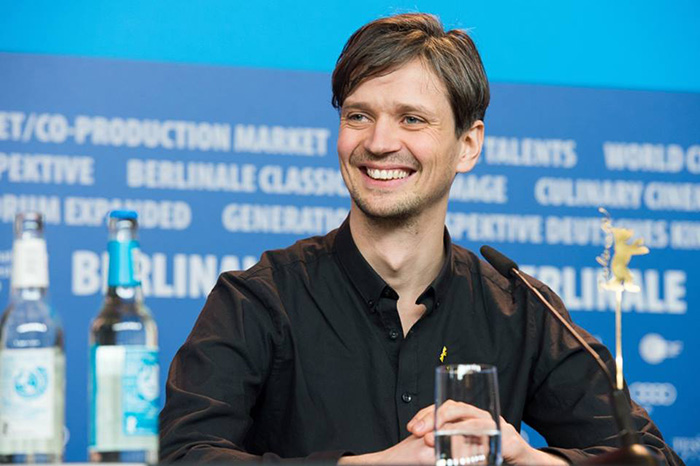
I like that too. That’s really great. I also wanted to touch on your cinematographer Sturla Brandth Grøvlen being a character himself in his absence. What type of preparation was taken to ensure we don’t see the crew in frame or him through reflections?
It was more about finding the spirit than to really coordinate in detail or even, of course, block anything. There were two important things that Sturla and I had to discover. The first one was: can I anticipate? He has to go with it and not be afraid of mistakes. We found something like you’d call a war photographer—he’s caught in this situation and he hangs on and he’s not going to let go. And the next step was to always have Victoria on your mind. We don’t have to film her all the time, but we always have to return to her and make her the center of whatever is going on. If she’s looking at stuff—that’s cool. But we always got to return to her and really build this film—also from a camera aspect—around her.
From that sprang all the decisions for detail. And I had to let Sturla go and make those himself. We did rehearse those and we shot the one-take three times, so I was able to look at it and was always able to give him feedback.
What can we expect next from you?
There’s a book that I read in 2011 that I just bought the rights to called Denial [A Memoir of Terror]. It’s the autobiographical story of Jessica Stern—she’s an expert on terror, very renowned. She [also] was with the Clinton administration and taught at Harvard School of Law.
She goes back to her hometown to maybe for the first time really explore the time when she was raped at fourteen because the police believe that the guy that did it is still at-large. She’s coming back home as a strong and successful woman with a lot of self-esteem. Being an expert on terror—and most terrorists are men—she’s going back to face this ultimate trauma in her life.
For me it’s very touching, but there’s also on some level in exploring it a tremendous part for a woman in her forties. It’s tremendous—it transcends the, “Oh, this is a story about a woman.” I’m very touched by this idea that you return to the core and that there’s something, once you’ve grown up and become strong enough, that needs you to go back and explore maybe the first sin that has been done upon you—or whatever you want to call that.
I think it has a wonderful ending and it’s very strong. I’m looking forward to having the chance—because in 2011 I wasn’t able to pull it off. And now I’m talking to you and people here in LA and they’re asking, “What are you doing next?” and I can say [Denial]. It feels really great.
Victoria hits limited release on Friday, October 9th.

